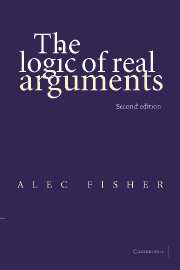Book contents
- Frontmatter
- Contents
- Preface to the first edition
- Preface to the second edition
- Acknowledgements
- 1 Introduction
- 2 A general method of argument analysis
- 3 A first example – from Thomas Malthus
- 4 Reasoning about nuclear deterrence
- 5 An example from John Stuart Mill
- 6 Arguments about God's existence
- 7 How do your mind and body interact?
- 8 Suppose for the sake of argument that …
- 9 An example from Karl Marx
- 10 Evaluating ‘scientific’ arguments. Some initial examples
- 11 Philosophical assumptions
- Appendix: Elementary formal logic
- Exercises
- Bibliography
- List of further reading
- Index
8 - Suppose for the sake of argument that …
Published online by Cambridge University Press: 05 June 2012
- Frontmatter
- Contents
- Preface to the first edition
- Preface to the second edition
- Acknowledgements
- 1 Introduction
- 2 A general method of argument analysis
- 3 A first example – from Thomas Malthus
- 4 Reasoning about nuclear deterrence
- 5 An example from John Stuart Mill
- 6 Arguments about God's existence
- 7 How do your mind and body interact?
- 8 Suppose for the sake of argument that …
- 9 An example from Karl Marx
- 10 Evaluating ‘scientific’ arguments. Some initial examples
- 11 Philosophical assumptions
- Appendix: Elementary formal logic
- Exercises
- Bibliography
- List of further reading
- Index
Summary
‘Supposition’ explained: and how to handle simple cases
In this chapter we deal with a distinctive kind of reasoning – suppositional reasoning. Most informal logic/critical thinking texts make no mention of it at all (although there are some notable exceptions, for example Stephen Thomas's Practical Reasoning in Natural Language). This is surprising since this kind of reasoning is elegant, powerful, and extremely common, as we shall illustrate in the next three chapters.
The arguments considered in most texts employ only assertions: in speaking of reasons and conclusions they are always talking about asserted propositions – propositions which their authors have put forward as being true (cf. our remarks on assertion in Chapter 2, p. 23). However, some arguments reach their conclusion not by asserting their starting points, but by assuming or supposing something ‘for the sake of argument’ as it is often described.
If someone begins an argument by saying ‘Suppose that oxygen does not burn’ he is not asserting that oxygen does not burn – he is not presenting this as true. Indeed he may well know that oxygen burns and he may be setting out on a reductio ad absurdum argument to prove that it does. Suppositions then are not assertions.
An atheist who begins to argue her case by saying, ‘Suppose there is an omniscient Being of the sort in which Christians believe’, is not asserting (claiming) that there is a Christian God (because she doesn't believe that there is one).
- Type
- Chapter
- Information
- The Logic of Real Arguments , pp. 115 - 131Publisher: Cambridge University PressPrint publication year: 2004



